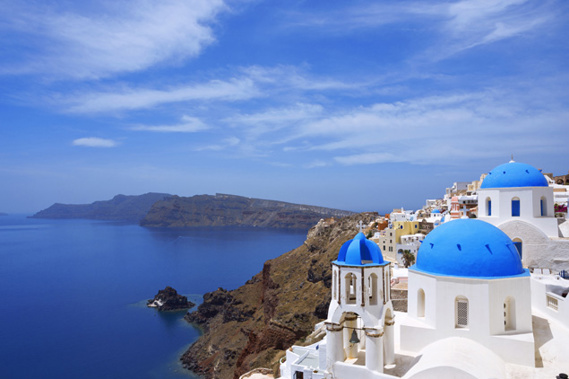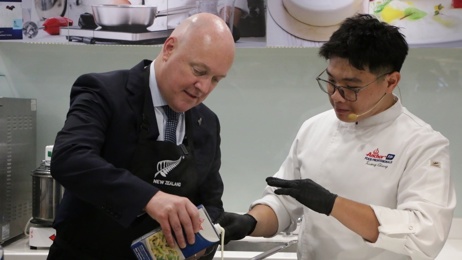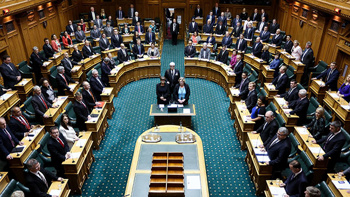
Late last year, I taught my final course for Victoria University of Wellington, guiding 19 young Kiwis around Greece for a Classics field trip. The trip offered plenty of food for thought (not to mention food) for anyone interested (and how could you not be?) in the stupendous artistic and intellectual achievements of the ancient Greeks. But it also got me thinking about Greece in the present.
When I first travelled to Greece, as a Classics-drunk schoolboy in the year 2000, Athens seemed like an affront to my expectations: dirty, smog-choked and chaotic.
By the time of my next visit in 2009, something had changed. I glided into town on an efficient, squeaky-clean and air-conditioned new metro line, serenaded most of the way by classical music. The air in town was noticeably cleaner. And there was a new Acropolis museum, infinitely more modern and spacious than its cramped predecessor.
Between 1993 and 2007, Greece boomed. The country’s economy grew by over 60 per cent, with per capita GDP increasing more than 50 per cent. The benefits from Greece’s arguably premature accession to the European Economic Community (now the European Union) in 1981 seemed obvious.
In 2002, Greece even climbed out of last place in the EEC in GDP per capita terms, overtaking Portugal. In 2007, the average Greek was only about US$1000 poorer than the average Kiwi, according to World Bank figures.
Greece’s boom was fuelled in large part by debt, private (with Greeks snapping up leases for German cars) but especially public. According to the International Monetary Fund, pensions and social transfers went up by 7 per cent of GDP between 2002 (when Greece traded its ancient drachma for the Euro) and 2007. Expenditure on public-sector wages went up by 3 per cent of GDP. By 2009 Greece’s debt was almost twice its GDP, and its deficit was more than 15 per cent – about 5 times the EU limit.
At this point, things started to fall apart. In 2010, an audit of Greece’s finances by the EU found that the country’s fiscal deficit was more than twice what it had estimated. The markets went cold on Greece, and despite a dozen rounds of spending cuts and tax rises and three bailouts from the International Monetary Fund and the EU, in 2015 Greece made history by becoming the first developed economy to miss a repayment to the IMF.
To make matters worse, the most obvious means of easing some of the pressure – depreciating its currency to boost exports – was now out of Greece’s hands, with its currency no longer truly it’s own.
It’s hard to exaggerate the depth and desperation of what Greeks call “the crisis” (i krisi). The Greek economy contracted ever year from 2009 to 2016, the longest recession recorded in a developed economy. The drop in per capita GDP terms (to almost 75 per cent of what it was at the start of the crisis) was almost as severe as the Great Depression in the US.
And the recovery has been far slower, with Greece only now surpassing the level of per capita GDP it attained two decades ago, with the heady heights of 2007 a distant memory.
Meanwhile, Greece has plummeted down the global economic pecking order. Every EU country that was poorer than Greece in 2007 in per capita terms has since overtaken it: Malta, Czechia, Slovenia, Lithuania, Estonia, Poland, Portugal, Hungary, Latvia, Slovakia and Croatia. Only one (Bulgaria) has so far failed to overhaul it.
2009 to 2016 were good years for me; as a PhD student and then a young lecturer specialising in classical Athens, I was able to travel to Greece every year for weeks, sometimes months, at a time.
But they were terrible years for Greece. The Greek archaeologists I knew all worked several jobs to try to make ends meet. In the summer of 2011, every few days that I headed back through Syntagma (Constitution) Square outside of Greece’s Parliament, I found protests blocking my way. Sometimes they turned violent.
One morning as I headed to the dig through a bombed-out Syntagma, with the tang of tear-gas still lingering in the air, I saw a homeless man sitting next to the shattered windows of a McDonald’s. When he saw me, he lifted his arms and shouted “Ellada!” (Greece!) in mock celebration.
These days, though, there are reasons for genuine, if cautious, celebration. GDP has grown solidly for three consecutive years. Unemployment is down from 27 per cent at its peak in 2013 to around 9 per cent today. In August 2022, Greece left the programme of EU supervision that was imposed on it in 2010. And late last year, The Economist chose Greece as the best-performing economy in a group of 35 developed nations for the second year running.
Much of this is a result of the structural reforms that were part of the conditions of the almost €300 billion ($527b) in bailout funds that Greece received during the crisis. These included painful but necessary reforms to the public services and to pensions as well as the privatisation of state assets, including airports and the seaport of Piraeus, one of the busiest in Europe.
But the recovery has also been given a boost in recent years by the policies of the centre-right New Democracy government led by Prime Minister Kyriakos Mitsotakis, who was first elected in 2019 and was granted a second term by voters in June last year.
Perhaps the most important achievement of the new government has been to restore the confidence of investors. Corporation tax has been cut from 28 per cent to 24 per cent and the tax on dividends has been halved from 10 per cent to 5 per cent. Red tape has been slashed, and a new National Transparency Authority set up to fight public sector graft.
In January 2020, Mitsotakis declared that Greece was “open for business”, and investors have gotten the message. Greece received almost €7b of foreign direct investment in 2022, up from only €5b in 2019 and a paltry half a billion in 2010.
A few remnants of the old, top-down approach still linger, with price-fixing (long out of fashion in most developed economies) still applied to bottled water. And that most debunked of economic philosophies, communism, still retains a surprising presence in Greek life, with the Communist Party of Greece taking almost 8 per cent of the popular vote at the last election.
In general, I can’t say that the Greece I toured at the end of last year seemed dramatically different to the Greece I first visited in the year 2000. Athens was still essentially the same city I first went to as a schoolboy, even if the coastline near the archaic port of Phaleron is about to be transformed with the completion of the ambitious new Hellinikon development.
But there were a few obvious signs of change. Greece has long had some of the highest smoking rates in the EU, but smoking is now down if not out, helped by the government’s pragmatic decision not to ban popular heat-not-burn devices. And stray dogs were nowhere to be seen in central Athens, the fruit of a government sterilisation programme started in 2021.
Being able to spend time in Greece has always been a blessing, if one that was long mixed, for me, with a sense of sadness about what was happening to the country. If the days of ancient glory are long gone, though, it may be that the prosperity Greece enjoyed less than two decades ago is now once again within reach – and this time, hopefully, that prosperity will be built on firmer foundations.
Take your Radio, Podcasts and Music with you









